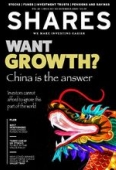Archived article
Please note that tax, investment, pension and ISA rules can change and the information and any views contained in this article may now be inaccurate.
You should always study a company’s shareholder base

As a shareholder you are often one among hundreds or even thousands of individuals and institutions which also own a slice of a business.
Many of these fellow shareholders will remain faceless or nameless entities but you can uncover the identity of the major shareholders in a company and there are several good reasons for keeping tabs on them.
DISCLOSURE RULES
In the UK the identity of anyone who owns 3% or more of a listed firm needs to be disclosed. Major shareholders can be asset management firms who will likely hold their position through a specific fund, founders and directors of the business, or sometimes larger companies in the same or a related industry (who possibly have some kind of commercial arrangement with the relevant company).
Businesses will disclose a list of major shareholders on their corporate website or in their annual report. Among the key things to look for, particularly in a smaller or medium-sized company, is if there are any asset management firms whose names might add some credibility to the story.
While you will almost always see the asset manager rather than the individual fund in the list of major shareholders, you could always check if one of your favourite products from a particular stable is invested by looking at the list of top holdings on the latest factsheet.
If you trust the process and acumen of the relevant manager, this might help you with the decision of whether or not to invest, particularly when you consider they will have done some digging into the fundamentals of the business and may well have had direct access to management.
Shareholders driving change
Major shareholders inevitably carry more weight with a company’s management and can therefore exert pressure to effect a change in strategy, for example, or push for the sale of a part of the business which is perceived as underperforming, or hold management’s feet to the fire over environmental or governance issues.
Some outfits specialise in being ‘activist investors’, buying stock in a company having already identified the changes they want to effect in the hope this will drive an improvement in the share price. Examples of activist investors include Crystal Amber (CRS:AIM) and ValueAct.
HOW CONCENTRATED IS THE SHAREHOLDER BASE?
Another thing you can uncover by looking at the list of major shareholders is how concentrated the shareholder base is or, in other words, what proportion of the issued shares are held by the largest holders.
This has several implications. It can impact the so-called ‘free float’ which is the amount that is publicly available to trade and not restricted. If most of the shares in a company are held by a few different parties who perhaps aren’t that keen to sell, then the number of shares that are freely bought or sold can be quite limited.
As an individual investor this can make it difficult to trade stocks, particularly if there is a piece of significant news like a contract win, profit warning or better-than-expected results.
DOMINANT SHAREHOLDERS
Under the UK Takeover Code if a single shareholder moves above 29.9%, they are required to make a bid for the outstanding shares.
However, the Code only applies to listed companies with a registered office in the UK, Channel Islands or Isle of Man (as well as some incorporated in Europe). There are many firms on the London Stock Exchange to which this does not apply.
If one shareholder or group of shareholders is too dominant it can be bad news for minority holders as their interests may be neglected. Measures such as the appointment of friendly directors or even a delisting of the company could be forced through against their will.
If a dominant shareholder opts to push for a delisting it can have very negative implications for other investors. Once a firm has left the public arena, they will find little or no market for their shares.
Analysing a shareholder list

The table shows a list of substantial shareholders in publishing firm Quarto (QRT).
Former Quarto chief executive and current executive director Chuk Kin Lau is the top shareholder at 40.8%. As Quarto’s registered office is in Delaware in the US, a mandatory offer under the Takeover Code wasn’t triggered when Lau’s holding went above 30%.
Second on the list is Italian publisher Giunti, followed by another former chief executive, Laurence Orbach.
In 2018 Orbach and Lau managed to get themselves and two other individuals elected as directors at that year’s AGM without having made a proposal in advance of the meeting.
Orbach briefly served as executive chairman before stepping down. At the time their combined holdings added up to 47% of the issued share capital.
Herald Investment Management is fourth on the shareholder list, with some basic research revealing the shares are held in its Herald Investment Trust (HRI).
Important information:
These articles are provided by Shares magazine which is published by AJ Bell Media, a part of AJ Bell. Shares is not written by AJ Bell.
Shares is provided for your general information and use and is not a personal recommendation to invest. It is not intended to be relied upon by you in making or not making any investment decisions. The investments referred to in these articles will not be suitable for all investors. If in doubt please seek appropriate independent financial advice.
Investors acting on the information in these articles do so at their own risk and AJ Bell Media and its staff do not accept liability for losses suffered by investors as a result of their investment decisions.
Issue contents
Editor's View
First-time Investor
Great Ideas
- 122% in four months: This stunning run for The Panoply should continue
- Primark owner Associated British Foods is well placed for a recovery
- Aviva chief delivers on promise to add shareholder value
- Big transactions at Pets at Home following first half results
- Cheap access to a hot style with a 4.9% yield
Money Matters
News
- Investors warned of tracker flip risk ahead of Tesla’s S&P 500 entry
- Here’s why gold has sold off, copper has rallied and oil remains volatile
- Hipgnosis benefits from change in valuation method
- The companies eyeing Arcadia assets after collapse
- Kingspan ESG credentials clouded by Grenfell inquiry
- Life sciences industry veteran David Evans launches new investment company
- Consequences of the pound rally on certain UK stocks
- Fabric coating Covid killer HeiQ to join UK stock market
 magazine
magazine








